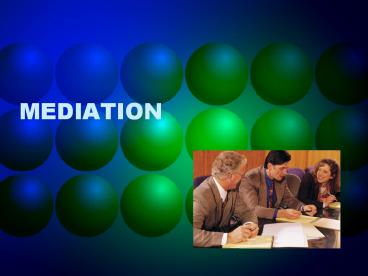MEDIATION - PowerPoint PPT Presentation
1 / 17
Title:
MEDIATION
Description:
Preservation of an Ongoing Relationship or Termination of a Relationship in a More ... otherwise required to testify concerning a mediation in any subsequent ... – PowerPoint PPT presentation
Number of Views:2342
Avg rating:3.0/5.0
Title: MEDIATION
1
MEDIATION
2
What is mediation?
- Mediation is often referred to as being assisted
negotiation. - It is a voluntary process in which parties
attempt to resolve a dispute with the help of a
neutral 3rd party called a mediator. - The mediator is not a judge and does not decide
who is right. - Mediators use many of the skills that negotiators
use.
3
What types of disputes can be mediated?
- Civil litigation
- Family/divorce
- Consumer
- Workplace/employment
- Neighborhood
- Landlord/ tenant
- Business contracts
- Disability issues
- School
- Church
4
When is mediation NOT appropriate?
- An incident had just occurred and people are too
upset. - One party is using mediation to escalate the
dispute - One party seems incapable of listening
- One party might be better off using the courts
- The issue deserves public attention.
5
TYPES OF MEDIATION
- Facilitative
- Evaluative
- Transformational
6
WHY MEDIATE?
- Economical Decisions
- Rapid Settlements
- Mutually Satisfactory Outcomes
- High Rate of Compliance
- Comprehensive and Customized Agreements
- Greater Degree of Control and Predictability
- Personal Empowerment
- Preservation of an Ongoing Relationship or
Termination of a Relationship in a More Amicable
Way - Workable and Implementable Decisions
- Agreements that are Better than Simple
Compromises or Win/Lose Outcomes Decisions that
Hold Up Over Time
7
STEPS IN THE MEDIATION PROCESS
- Mediator opening statement
- Party opening statements
- Exchange/negotiation
- Caucuses
- Closure/agreement
8
MEDIATOR OPENING
- Welcome and introduction
- Purpose of mediation the mediators role
- Logistics timeframe, breaks, restrooms
- Confidentiality explained
- Agenda
- Caucusing explained
- Ground rules
- Questions
- Commitment to proceed
9
THE MEDIATORS ROLE
- Convener
- Educator
- Communication Facilitator
- Translator
- Questioner and Clarifier
- Process Advisor
- Angel of Realities
- Catalyst
- Responsible Detail Person
10
HOW TO OVERCOME IMPASSEby Department of Veterans
Affairs
- http//www.mediate.com/articles/va2.cfm
11
MODEL STANDARDS OF CONDUCT FOR MEDIATORS
- Self-Determination
- Impartiality
- Conflicts of Interest
- Competence
- Confidentiality
- Quality of Process
- Advertising and Solicitation
- Fees
- Obligation to the Mediation Process
12
Uniform Mediation Act of 2001 (Amended in 2003).
- Adopted by
- District of Columbia
- Illinois
- Iowa
- Nebraska
- New Jersey
- Ohio
- South Dakota
- Utah
- Vermont
- Washington
- Idaho
- Proposed in 2008 by
- New York
13
What legal protections apply to insure
confidentiality in mediation?
- Contractual agreements
- Statutory protection
- Federal Protections
- Federal Rules of Evidence 408 protects against
admissibility of offers and compromises or
conduct and statements in negotiations - Federal Rules of Civil Procedure 68 prohibits
later admissibility of offers in negotiations
conducted during litigation. - State Protections Vary
14
Ga. Alternate Disp. Resol. Rule 7
- Any statement made during a court-annexed or
court-referred mediation or case evaluation or
early neutral evaluation conference or as part of
intake by program staff in preparation for a
mediation, case evaluation or early neutral
evaluation is confidential, - not subject to disclosure,
- may not be disclosed by the neutral or program
staff, and - may not be used as evidence in any subsequent
administrative or judicial proceeding.
15
Ga. Alternate Disp. Resol. Rule 7
- Any document or other evidence is not subject to
discovery. - A written and executed agreement or memorandum of
agreement resulting from a court-annexed or
court-referred ADR process is discoverable unless
the parties agree otherwise in writing.
16
Ga. Alternate Disp. Resol. Rule 7
- Neither the neutral nor any observer in a
court-annexed or court-referred ADR process may
be subpoenaed or otherwise required to testify
concerning a mediation in any subsequent
administrative or judicial proceeding. - A neutral's notes or records are not subject to
discovery.
17
Confidentiality does not extend to
- a situation in which
- a) there are threats of imminent violence to self
or others or - b) the mediator believes that a child is abused
or that the safety of any party or third person
is in danger. - documents or communications relevant to legal
claims or disciplinary complaints brought against
a neutral or an ADR program and arising out of an
ADR process. - Documents or communications relevant to such
claims or complaints may be revealed only to the
extent necessary to protect the neutral or ADR
program. - Parties should be informed of limitations on
confidentiality at the beginning of the
conference. - (Ga. Alternate Disp. Resol. Rule 7)

